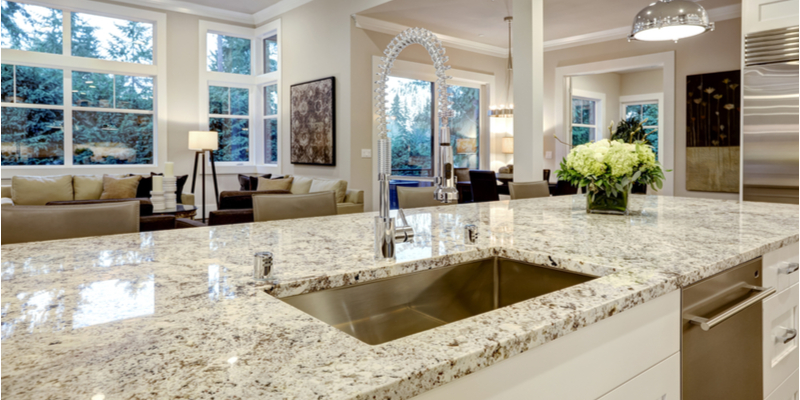The debate continues. Is granite the best countertop choice? Does quartz put all other countertops to shame? Which is better granite or quartz? Or does all the controversy come down to what works best in your kitchen and with your personal cooking style? What is all the controversy really about? Let’s find the perfect countertop for you as we explore the differences and similarities of granite and quartz.
What is Granite?
Granite is 100 percent natural stone that is very hard. Mined from quarries worldwide, it can be cut down to size and polished to perfection for use in your home. Because it is all natural, formed as molten substances cool and solidify, granite comes in a wide array of colors and distinctive patterns. Granite can be as subtle or as bold as your taste, offering a timeless look to complement your kitchen or featuring a daring signature look with unique mineral infusion. The choices are as boundless as nature, with no two granite countertops ever alike.
What is Quartz?
Quartz is approximately 95 percent natural stone combined with five percent polymer resins which gives it strength and durability. Quartz continues to grow in popularity due to its lovely aesthetics. It features the look and feel of completely natural stone but allows homeowners to create a design that is all their own. Unlike granite, in which you must search for the pieces to match your style, selecting the right quartz is considerably simpler.
Is Granite or Quartz More Environmentally Friendly?
Granite comes to your kitchen via the quarry, which means energy is expended in the quarrying process as well as its transportation to your home. Should you live in the southern U.S. and simply have to have premium granite from Italy, transportation will be considerable. Opting for a more local slab of granite or scouring salvage yards for pieces is the more environmentally friendly approach to granite.
Quartz, on the other hand, is engineered, making it more environmentally friendly provided you use regional manufacturers and fabricators making the transportation distance and energy used minimal.
Which is Easier to Maintain – Granite or Quartz?
Both granite and quartz countertops need regular care. Granite needs to have daily cleanings with an appropriately mild household cleaner or soap and water. You’ll need to know that acids and some oils can stain granite. Having your granite resealed annually will protect it and ensure its longevity. Spills on quartz countertops should be cleaned with soap and water or an appropriate household cleaner, and outside of regular cleaning, no other maintenance is needed. Because of quartz’s solid surface, resealing is not required.
Is Granite or Quartz More Durable and Long-lasting?
Though quite durable, granite is porous and will stain if spills aren’t cleaned up quickly. Granite is resistant to heat and other kitchen hazards making it strong and long-lasting. Take care, though, a heavy blow can damage granite. While granite is hard, quartz is harder and as a result more durable. Quartz isn’t porous so staining isn’t a worry. Quartz is nearly indestructible with the exception of high heat which can damage its surface.
The Bottom Line – Price – Which is More Costly?
The cost of granite plus installation in the average American kitchen falls in the range of $2,000 to $4,000. Savings can be had by purchasing granite from a wholesaler and doing your own preliminary demo, though installation should be done by a professional. Quartz pricing is based on quality and edging style and averages anywhere from $1,500 and $5,500 for an average American kitchen. And while you can do preliminary demo before your quartz installation, you need a professional to ensure your quartz is installed properly.

